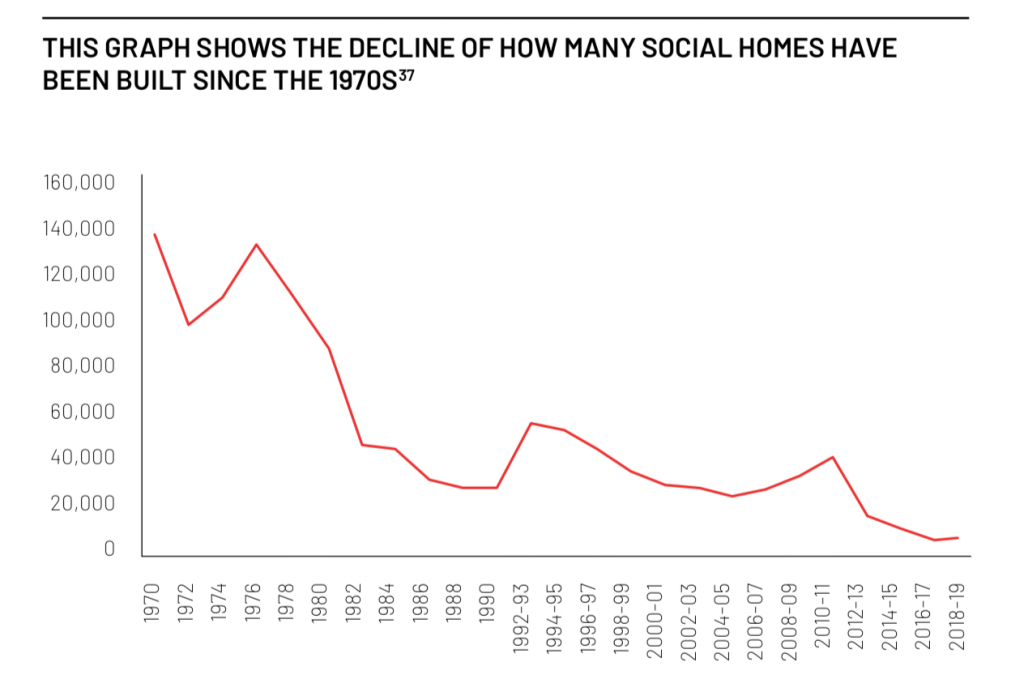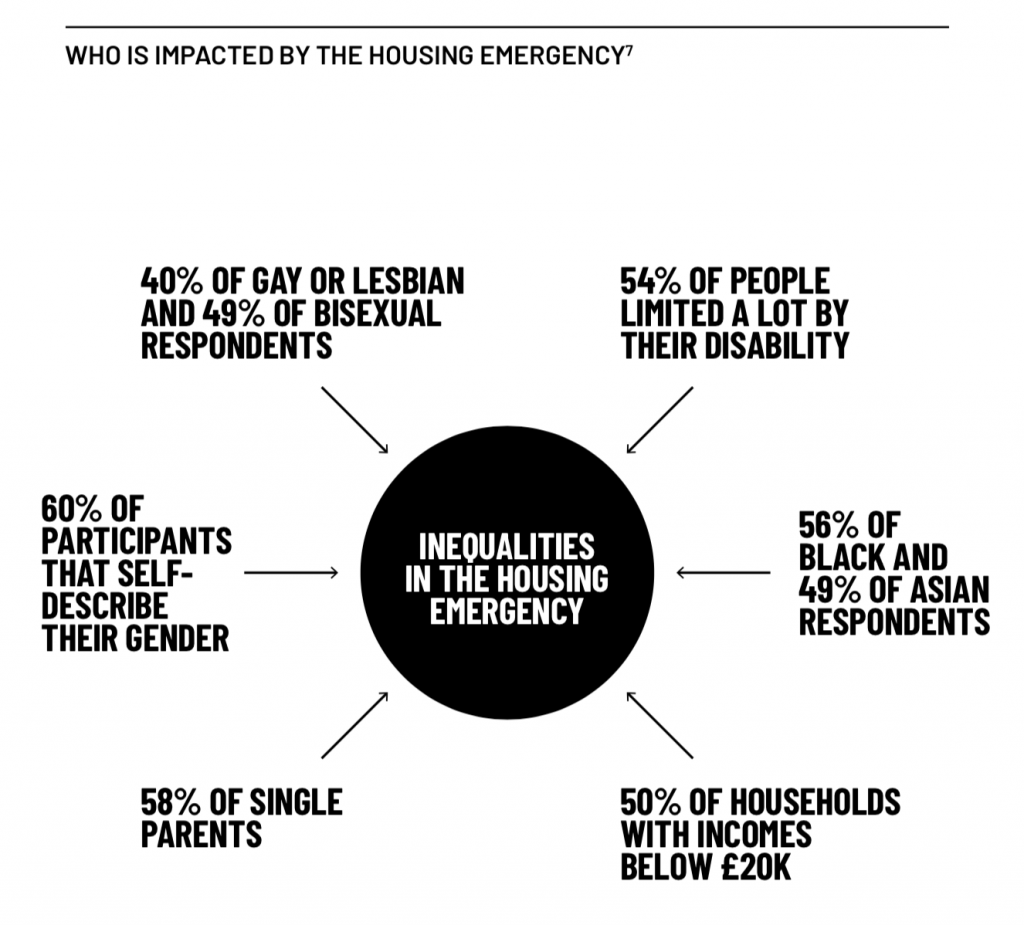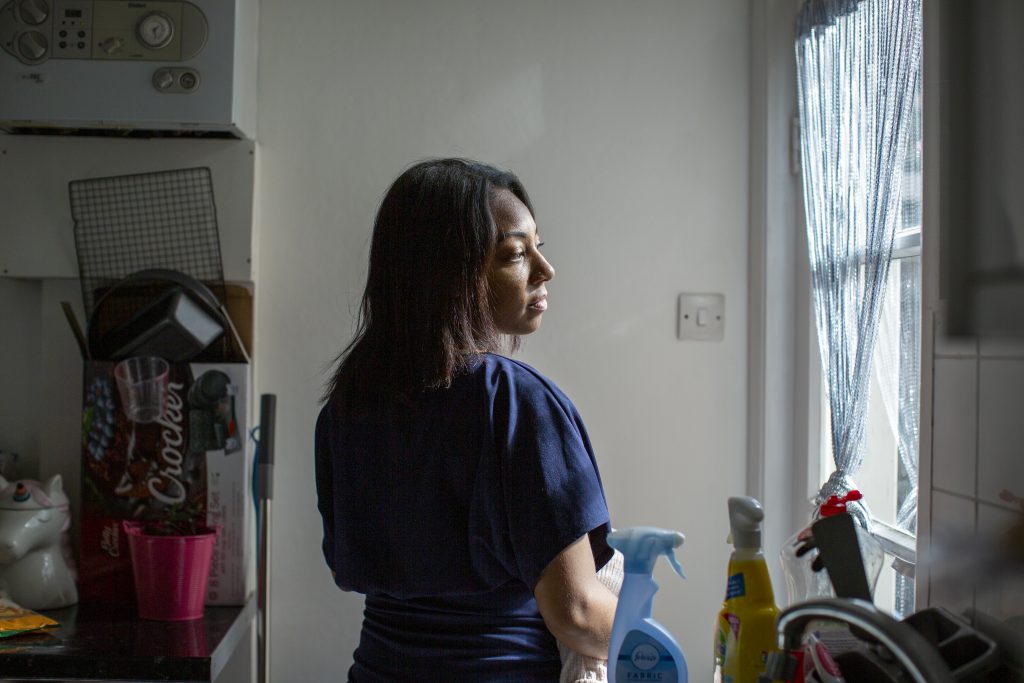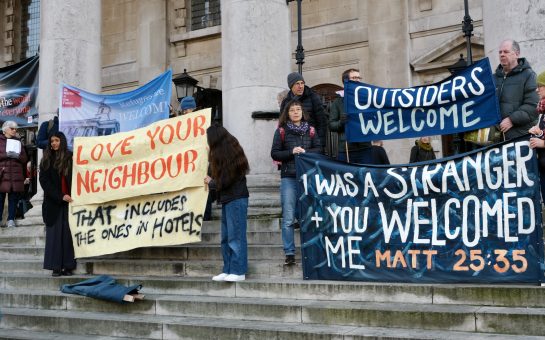Two in five adults in London do not have access to a safe or secure home according to a housing emergency report published today by Shelter.
Shelter, a UK charity campaigning to end homelessness and unsuitable housing, surveyed Londoners as part of a wider national study with YouGov on the housing emergency in the UK, which it found to be worsened by the pandemic among factors such as race, sexuality, and disability.
It combined this research with the results of latest government data on homelessness to conclude that over three million Londoners are impacted by the housing emergency, with 22 million people affected across Britain as a whole.
The key findings were published in a report titled ‘Denied the Right to a Safe Home’.
Shelter chief executive Polly Neate said: “Decades of neglect have left Britain’s housing system on its knees. A safe and secure home is everything, yet three million people in London don’t have one.
“Lives are being ruined by benefit cuts, blatant discrimination and the total failure to build social homes.
“Shelter believes a safe home is a human right, but the pain and desperation our frontline staff see every day shows this is still a long way off.
“That’s why we are fighting for the single mum who has to put her child to bed in a room covered in mould, and the disabled man living on the 12th floor with a broken lift.
“We are fighting for everyone impacted by the housing emergency, and as we emerge from the pandemic, we want the public and politicians to do the same.”
Shelter’s research, which surveyed 13,268 respondents across the UK, used eight criteria to measure if someone has access to a safe and secure home, assessing the affordability of their home, whether it is fit and stable, and finding out if they have been subject to discrimination.
Overall it concluded Britain’s housing system is unaffordable, unfit, unstable and discriminatory, made worse by the pandemic, and called on the government to de-escalate the housing emergency, and build at least 90,000 good quality social homes a year.

The report found the capital’s biggest housing issue, which impacts 1.9 million Londoners, is people living in unsuitable homes they cannot keep warm, or with a significant mould, damp or condensation problem which can reduce lung function and cause chronic health problems such as asthma.
The next two biggest issues were overcrowding and affordability, with approximately 828,000 of Londoners living in crowded conditions, sharing rooms and using living spaces as bedrooms, and 817,000 cutting back on food, heating and other essential items to pay their housing costs.
The national results also indicated gross inequalities in Britain’s housing system as:
- Black people were found to be 70% more likely and Asian people 50% more likely to be impacted by the housing emergency than white people.
- Adults with a significant disability were found to be disproportionately affected, 54% of disabled adults being without access to a safe or secure home compared to 30% of people without a disability.
- LGBTQ+ individuals were found more likely to be impacted by the housing emergency, with 40% of homosexual individuals and 49% of bisexual individuals without a safe or secure home compared to 32% of heterosexual people.
- Households on less than £20k a year were found to be 67% more likely to be impacted by the housing emergency than households earning £40-45k.
- Approximately 65% of single mother households were found to be impacted by the housing emergency compared to 37% of two-parent households.

Single mum Fatima, 44, who is homeless and has been sharing one small room in a London hostel for the last five years with her 10-year-old son, spoke to Shelter about the challenges she’s faced over the pandemic.
She said: “I don’t feel like I have control over my own life.
“To eat, we have to go to my mother’s. I cannot even cook a meal for my son. We’re not allowed family or friends over.
“Where we live is not a home. My son has spent half his life trapped in this hostel. What is that doing to him? During lockdown he fell behind at school. There’s no room for him to study here and there’s no WiFi. But even if there were the hostel is so cramped and noisy that there’s no way he could concentrate.
“We just need somewhere to call home. It doesn’t have to be much, just a safe place for us. We have been living in limbo for years.”

North London single mother Krystal Rose, 27, privately rents a one bed flat with her daughter, previously living in a hostel whilst homeless and pregnant.
She spoke to Shelter about the severe mould and damp issue affecting her home.
She said: “I pay good money for this place and I can’t afford a big food shop anymore. I really have to watch how much I eat.
“I thought for the amount of money it was going to be a proper home. I’ve tried to make it feel like one, but it’s not. The mould has ruined my daughter’s cot and all our clothes. We’re living out of bags. I’m asthmatic and we have both become ill because of it. It’s just been about coping. I’m on antidepressants now because of the stress.
“All I want is a home where we can feel safe and comfortable. The simple things like a wardrobe to pack your clothes away; a living room with a sofa to sit on; not having to share a bedroom. My daughter doesn’t know what that feels like. It’s like our lives can’t move forward.”
London Councils’ executive member for housing & planning Darren Rodwell said: “Addressing the housing emergency should be a top priority for the government as we look to build back better from the pandemic.
“The emergency is particularly severe in London, where we face the highest homelessness levels and worst housing pressures in the entire country.
“Boroughs are determined to do everything we can to ensure every Londoner has a safe and secure home, but councils need urgent government action to make this happen.
“Only the government can bring forward the massive investment in social housing and changes to the welfare system required to resolve the worsening crisis.”
London Councils estimates there are 165,000 homeless Londoners living in temporary accommodation arranged by their local borough, representing roughly two thirds of the total number across England, and highlights that a quarter of a million Londoners are on waiting lists for council housing.
London Councils is calling on the government to confirm long-term and short-term funding arrangements for local homelessness services, end the five-week wait for Universal Credit payments and ensure it matches the cost to rent in the Capital, restore government funding for councils’ local welfare assistance schemes (abolished in 2016) amongst other demands.
To join Shelter’s campaign, make a donation, or get expert housing advice, visit shelter.org.uk
Main Image Credit: Copyright of Shelter ©




